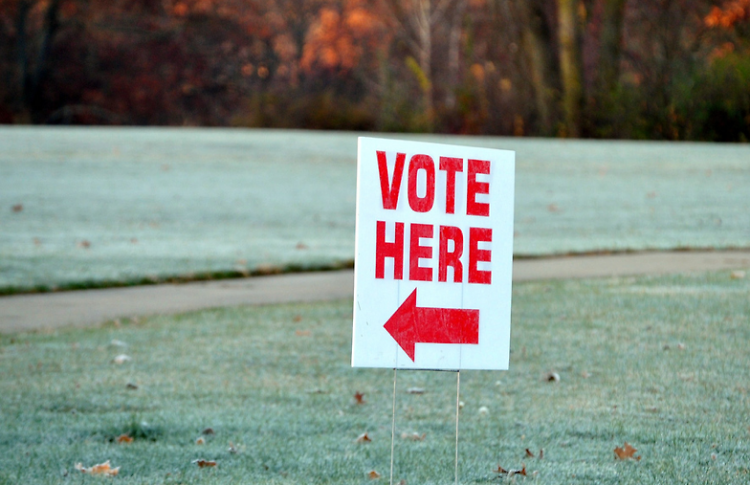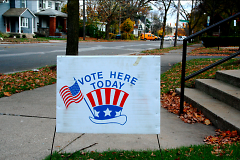As we begin another election day, I am concerned, like many others, about voter turnout and what it will mean for our local candidates and issues. Many issues in this city and state have been won by only a few hundred or few thousand votes.
Local political issues yield the lowest turnouts in Grand Rapids. What makes this so disheartening is that local politics is the most tangible of our levels of government. Many of the “bread and butter” issues we deal with in our everyday lives are based off local funding and policy. Our city and state has its issues but one thing we can all agree on is that we are lucky to have the freedom to make decisions. As a combat veteran I have conducted operations in many countries where citizens face danger if they attempt to vote. Yet residents of the city who have always had the freedom and security to vote fail time and time again to exercise that freedom.
The national average for turnout in municipal election turnout is 25 percent with studies showing declining rates equal to that of national elections. Election results show that many times GR has come in lower than the national average.
In November, 2009, with commissioner races and a school operating millage, only 10 percent- 12,821 of the 126,676 registered voters- turned out. In 2011's November general election, 14 percent of our registered voters cast a vote when our city was deciding on its mayor. That same year only 8 percent of the first ward turned out to pick their representative.
In the presidential election in November 2012, the turnout was significantly higher in the city: 61 percent or 81,616. However, an average of over 7% of those voteres didn't go on to select their state representative or GRPS school board, or vote on proposals concerning the comptroller or marijuana decriminalization. An average of around 6,000 Grand Rapids residents took time out to show up at the polls and chose to abstain from local and regional politics when they simply needed to check a box.
This is a country-wide issue. The United States seems to not follow international trends in voter turnout. Typically, a higher ranking in a country's literacy rate, economy and population correlates with high voter turnout. Australia, Belgium, the Bahamas, Angola and Singapore have a 90-95% voter turnout. Germany, Sweden, South Africa, Argentina and Thailand all have 85-89% voter turnout. The U.S., which has a literacy rate of 99 percent, a GDP of 15.68 trillion dollars, and a population 313.9 million, in comparison, ranks at 66 percent, similar to Algeria, Burma, Mexico Ecuador and the Dominican Republic. Though a small portion of this can be explained by some country's practices of compulsory voting, what accounts for the rest of it?
Since 1964, the majority of public opinion polls have shown a significant decline in the public’s confidence level of political institutions and leaders. If people are not confident in our current politicians, then why is there so little turnout to vote for others in our city, state, and national elections?
Low voter turnout has been attributed to a number of reasons. Socioeconomic bias and class inequality is one main reason. A family’s wealth and level of education have a strong association with percentage of voters. Socioeconomic status has a strong correlation with individual’s willingness to take part in the political process (i.e. volunteering on campaigns, contacting officials, running for office). Even an individual’s physical health affects their likelihood of voting.
Political alienation has also had a strong correlation on voter turnout in the U.S. The eligible voter has a sense of powerlessness to influence the political system and feel incapable of having any meaningful impact on political events. Voting is seen as an infrequent act that bears little meaning to their daily life.
Voting barriers such as registration and the scheduling of elections during the workweek further enlarge the inequality in turnout between income levels. It is estimated that in 2008 an estimated three million voters did not vote due to registration problems. What is even more unsettling is that in the last few years more than dozen states have passed laws that raise the barriers to voting. Laws that require photo identification at polls, that cut back early voting periods, or create new restrictions on voter registration drives. These laws disproportionally restrict certain residents of our nation.
Four major factors correlate strongly with voter turnout in local elections, according to a study in California. The first factor that is associated with turnout is election time. Thirty-six percent more people voted for local government during presidential elections than off year elections. Second, the more services offered in a municipality the higher the rate of turnout. The third factor is local ballot questions: when citizens have a direct impact on their democracy they tended to show higher rates of turnout.
The fourth factor discovered in the study is especially important to Grand Rapids because it has to deal with our form of government. Local governments using the city manager form of government tend to have a lower rate of turnout. This is due to reducing the direct influence of voters by weakening the mayor and insolating the people from the executive branch by placing most of the power into the hands of an unelected city manager.
So what do we do with this information? How do we get more citizens involved in their local elections?
Currently, city leaders are studying different methods that have been proven to inflate turnout in all sections of the community. There are many organizations in the city that aid in registering and educating residents to vote.
Even if the best practices were in place and organizations that work with voters were fully funded, I still believe many residents of our community would still be complacent. I have met so many people who do not vote regularly because they believe voting will not solve their issue.
But our city is our issue. And as I stated in the beginning many issues in this city have been won by only a few hundred votes. Don't be complacent today. Vote. Exercise your freedom to affect change in your community.
The Rapidian, a program of the 501(c)3 nonprofit Community Media Center, relies on the community’s support to help cover the cost of training reporters and publishing content.
We need your help.
If each of our readers and content creators who values this community platform help support its creation and maintenance, The Rapidian can continue to educate and facilitate a conversation around issues for years to come.
Please support The Rapidian and make a contribution today.



